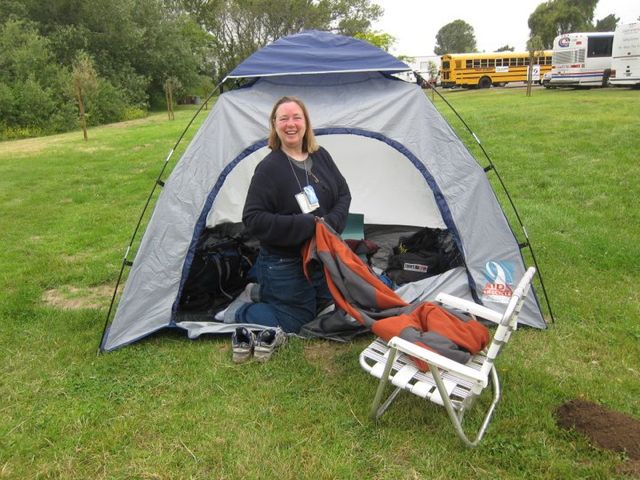
Journalists take being duped very seriously. The recent revelations that both the “Gay Girl from Damascus” and Paula Brooks, founder of LezGetReal, are straight white men pretending to be lesbians was a real shocker. OK – it’s not quite the same as discovering that New York Times Pulitzer Prize winner Judith Miller’s exclusive reporting on weapons of mass destruction in Iraq was based on inaccurate information provided by the discredited Ahmad Chalabi.
That reporting helped bolster the Bush administration’s cause for an unnecessary “pre-emptive” war, for which we are still paying. For the details on both hoaxes, please check out Adam Polaski’s in-depth reporting on The Bilerico Project. And see the video report on the “Gay Girl From Damascus” from Newsy below.
But please, make no mistake – these hoaxes are harmful. Thanks to the Internet, there is a cacophony of megaphones blaring opinions and analysis and a bunch of junk that people find titillating. I am a huge fan of Freedom of Speech and Freedom of Expression and am grateful I have a platform here to offer my point of view. But when journalists and bloggers break through the noise with crap they’ve made up just to get eyeballs and clicks on their website – even if it’s for a “good cause” – that has the effect of eroding the already soft ground on which the trustworthiness of news gathering in general stands with the public.
And when the source of news is in a hard-to-access place such as Syria during these revolutionary days in the Middle East – we need and want to believe the information we’re receiving. That’s why journalists and the US State Department jumped into action when word spread that the “Gay Girl from Damascus” had been apparently kidnapped by the Syrian government forces she criticized.
This is from the Saturday, June 12, Washington Post piece by Melissa Bell and Elizabeth Flock that exposed the hoax:
For nearly a week, the world followed the saga of Amina Arraf, the blogger who was celebrated for her passionate, often intimate writings about the Syrian government’s crackdown on Arab Spring protesters. Those writings stopped abruptly last Monday, and in a posting on her blog, “A Gay Girl in Damascus,” a cousin said Amina had been hauled away by government security agents.
News of her disappearance became an Internet and media sensation. The U.S. State Department started an investigation. But almost immediately skeptics began asking: Had anyone ever actually met Amina? On Wednesday, pictures of her on the blog were revealed to have been taken from a London woman’s Facebook page.
And Sunday, the truth spilled out: The gay girl in Damascus confessed to being a 40-year-old American man from Georgia.
The persona Tom MacMaster built and cultivated for years — a lesbian who was half Syrian and half American — was a tantalizing Internet-era fiction, one that he used to bring attention to the human rights record of a country where media restrictions make traditional reporting almost impossible.
Multisource political news, world news, and entertainment news analysis by Newsy.com
MacMaster wrote a couple of apologies. But is that sufficient?
A Reuters blog distinguishes this hoax from the trust broken by “real” journalists:
No doubt his fraud will be used to dredge up the media’s favorite topic of whether or not blogs are reliable, whether or not Twitter is reliable, whether or not you can trust journalists (people are dropping the names Jayson Blair, Janet Cooke and Stephen Glass online). But this isn’t a journalistic scandal: Tom MacMaster has very little in common with the reporters who have betrayed the public trust in the past by faking stories across a variety of topics over many years. They had no ideological premise (unless you count self-aggrandizement). MacMaster has much more in common with the misguided activists who have fooled the public with tales of victimization in order to advance an agenda.
Uri Friedman at The AtlanticWire, however, looks at some of the consequences of that hoax:
What damage has MacMaster done? Here’s what people are saying:
- Lent Credence to Syrian Regime’s Narrative: Syria’s state-run media has long argued that the international coverage of the Syrian uprising is nothing but a pack of lies, and indeed the state-run Syrian Arab News Agency is gleefully reporting that “MacMaster’s hoax aimed at enhancing continuous fabrications and lies against Syria in term of kidnapping bloggers and activists.”
- Distracted Media and International Community From Syrian Uprising: As NPR’s Andy Carvin, one of several journalists spearheading last week’s research into Amina Arraf’s identity, tweeted, “If we could only calculate the sheer number of hours we spent this week on #Amina, each one of which was an hour spent not on Syria itself.”
- Undermined Support for Middle Eastern Bloggers: “You have forever tarnished the reputation of bloggers in this region who chose to write in English,” writes a Lebanese blogger who identifies himself as Mustapha. “One day if I’m kidnapped by my government, many readers won’t care because I could turn out to be another Amina.”
- Endangered LGBT Syrians: “Because of you, Mr. MacMaster, a lot of the real activists in the LGBT community became under the spotlight of the authorities in Syria,” argues a gay Syrian activist named Daniel Nassar.
- Cast Doubt on Citizen Journalism in Middle East: The Washington Post‘s Melissa Bell and Elizabeth Flock note that “the hoax raises difficult questions about the reliance on blogs, tweets, Facebook postings and other Internet communications as they increasingly become a standard way to report on global events”–especially as regimes in the Middle East restrict foreign media access during the Arab Spring. At Al Arabiya, Muna Khan wonders what will happen to the thousands detained in Syria–”those who have as much courage as the hoax Amina but no avenue to get their voices heard. Will journalists who didn’t have the time to verify facts before giving Amina the international fame she received suddenly back off or labor over each detail before printing–by which it could be too late for the real Aminas out there?”
OK – now let’s bring that home. What will journalists and accuracy-minded bloggers do when they come across a blog with a horror story about same sex domestic violence – but the blog only uses anonymous sources? Or what about an email from someone who claims to be a gay person in the military or the loved one of someone suffering under Don’t Ask, Don’t Tell who needs to get an important story out about discrimination – what proof will we now require that this person is not a fraud?
How many stories will we now pass up for fear of being duped?
As for “Paula Brooks” – I “spoke” with the editor of LezGetReal several times via email and chats on Facebook. She constantly wanted me to write for the website as their person in LA. I explained that I already have a job as the news editor for Frontiers In LA. But I had no clue I was “speaking” with a dude. In fact, I was often sympathetic about Paula’s circumstances – whether her deafness or her situation with the kids. Now, I just feel stupid. But I see I have a lot of company.
Anyway – for the record – here’s the most recent photo of me, a “real” gay girl – Day 6 of the AIDS LifeCycle ride outside my tent. I haven’t gone “camping” since 1969 when I demonstrated as part of the Vietnam War Moratorium co-organized by David Mixner in April and then got high and soaking wet at Woodstock in August.

Dan Rather once told me: “I don’t care what people think about me – but I sure give a damn about my reputation.” Right now – whether they know it or not – the reputation of journalists and bloggers is pretty damaged by these hoaxes perpetrated by these two fake lesbians.

